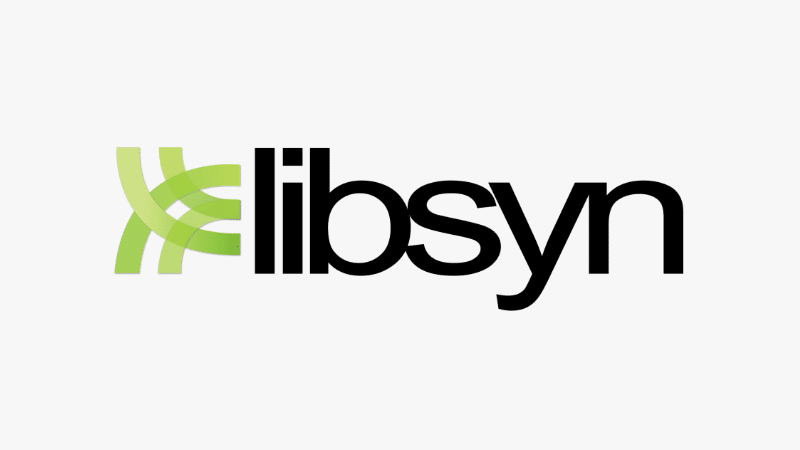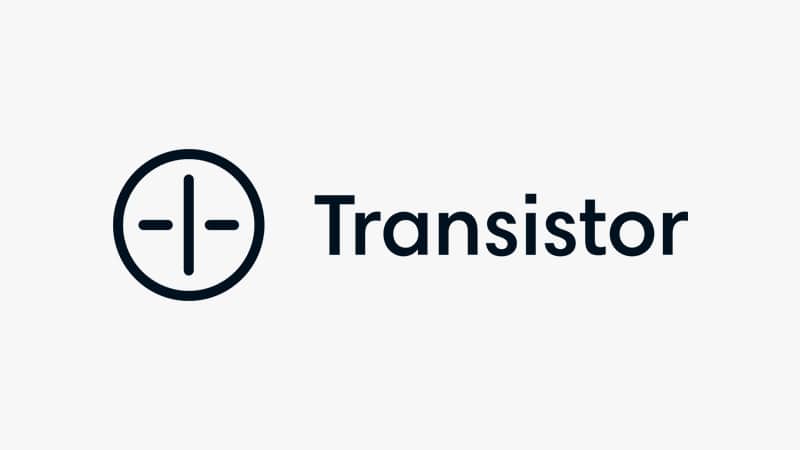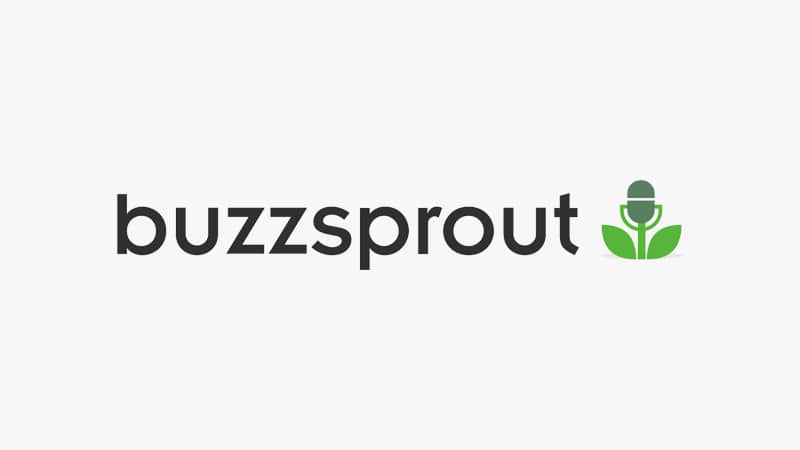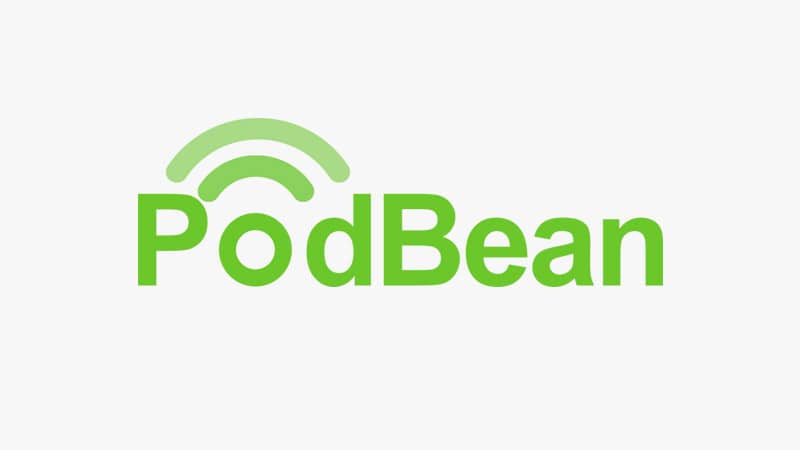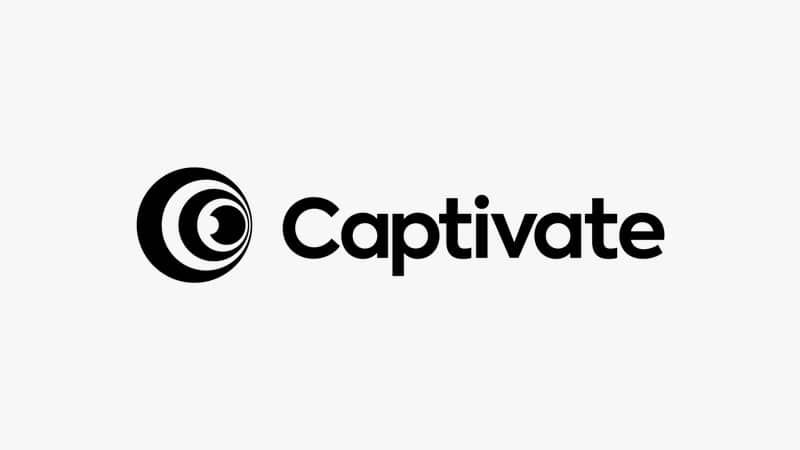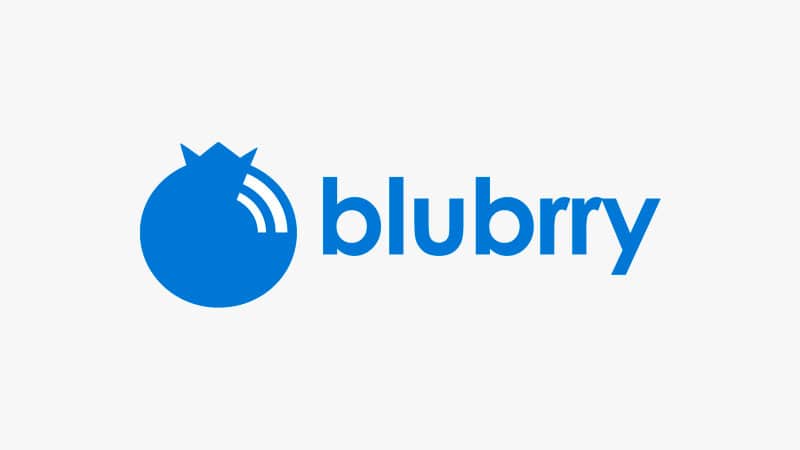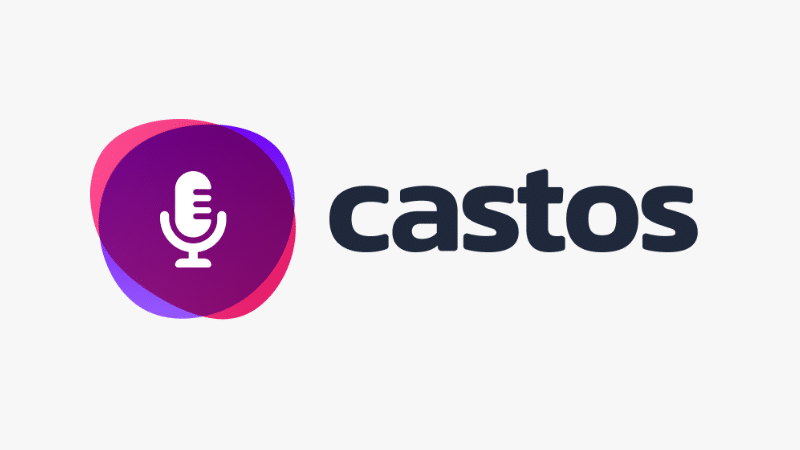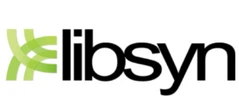
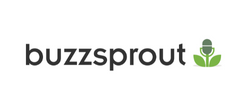
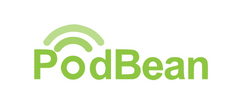

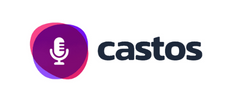
No one can argue the power of podcasting in 2024 — it has gone from an obscure form of media recorded in suburban garages, to full studio setups that reach millions of people per podcast.
The beauty of podcasting is, of course, you can still use a humble garage set up, and reach your desired audience. But it’s not as simple as talking into a high-quality microphone and uploading it to the internet.
If you’re an experienced podcaster, you might be here to see if you can tweak your podcast hosting solutions. If you’re new to podcasting though, you might just be realizing that after podcast equipment, podcast hosting is another step to think about on your journey to podcasting glory.
There are a myriad of options for hosting your podcast, with each service provider vying for your attention (and wallet) with different features to suit different needs. That of course can create confusion whether you’re a podcasting pro or a relative newcomer, so in this article, we’re going to go through the twelve top podcasting platforms, with the ultimate goal of helping you find the perfect solution.
What Is a Podcasting Host?
So as we said, you can’t just record something on your computer, and wham, bam, you’re Joe Rogan. It’s also not as simple as just uploading your podcast audio/video to your website either, as your website host won’t want to handle that much data.
So what you do need is a podcast hosting platform, which will store your podcast online, and help distribute/play it to your audience. Podcast host service providers are basically just online servers that offer a few extra services that aid the successful creation and growth of your podcast.
These extra features on offer are many and varied, but let’s break it down to the basics of what you might want in a podcast hosting platform. From there you’ll be better informed about what is best for your podcasting needs.
What to Look for in Your Podcasting Hosting Platform
While most podcast hosting platforms will provide you with a set of basic functionalities, it’s better to look for solutions that come with a wider range.
As a beginner, it is natural to think that the storage, an RSS feed, and analytics are enough to get you going. The truth is, as your podcasts evolve, you will likely need better and more advanced functionalities.
Working with a comprehensive tool from the beginning means fewer bumps along the way.
It’s wise to know from the beginning the features and functions you should look for in a podcast to sustain a decent career out of it. To make things easier, we have prepared a list of the features every aspiring podcaster must look out for.
Uploads/Storage
Here you want to think about how much content your podcast host will store for you, as well as how long they will store it.
There are many options on this list that will store as much content for an indefinite amount of time — however, there will be some cheaper options that will only store so much content for you, or even delete it after a predetermined amount of time.
They may also limit how many hours of audio you upload per month.
Be sure to look at the storage options to make sure it suits your needs, and that you don’t get caught short by having your precious podcasts being deleted forever.
Bandwidth
Bandwidth is how much data the podcast hosting provider will give you for listeners to stream or download your podcasts.
A podcast host might limit your bandwidth by data, e.g. listeners can only download 250GB in total each month. That might not sound like a lot, but generally, 250GB should be enough for 20,000 to 40,000 downloads per month.
However, there will also be many options that have unlimited bandwidth, meaning you can have as many streams, and therefore listeners, as you desire. Just keep in mind you pay for what you get here.
Website Integration
Many podcast host services will either help create or automatically create a website just for your podcast. On that website, you can integrate your podcast player, show, previous episodes, or even sell merchandise, etc.
This is super helpful for creating a portal for your audience, but be aware website integration can be anything from too limited to offering more features than you need.
Analytics
Analytics are what you pay attention to when you want to go from just having fun with your podcasting, to potentially actually making money from it.
Podcast analytics can tell you how many listeners you have, how long they listen for, and what your audience/listenership trends look like.
Like anything, analytics will range in detail from basic for beginners, to in-depth and granular for the professionals.
Content Repurposing
It’s becoming more and more popular to upload podcasts (even just audio versions) to YouTube. This provides you with a new audience, and potentially (if your audience is big enough), a new source of income. Some of the podcast hosts below will automatically upload your episodes to YouTube, saving you time, all while expanding your audience.
Some people also want to be able to transcribe their podcasts, either for the hearing impaired, or perhaps to have a written version for use in the future. Several outside services can do that for you, but you’ll find that some of the hosting providers below can do that for you.
Marketing and Monetization Support
Hey, look, it’s the podcasting dream to make a nice living off talking about what you love right? So it makes sense that most podcasting hosts will have ways to help you either start to make money or improve your earnings from your podcasts.
This can range from charging to listen to your podcasts, putting in ads, or allowing you to crowdfund from your audience to let them support you.
If you’re just starting out, we recommend focusing on the quality of your content, but the long-term goal is usually to at least make a little bit of money!
That covers the basics of what you are looking for in your podcast hosting, so let’s take a look at what the best podcasting hosting platforms are in 2021.
The Best Podcasting Hosting Platforms for 2024
| Platform | Bandwidth | Analytics | Price (Monthly) | Website |
|---|---|---|---|---|

|
Unlimited bandwidth | Yes | $5-Quote-based | |

|
10,000 - 150,000 downloads/streams per month | Yes | $15.83 - $82.50 | |

|
100GB per month on free plan | Yes | Free - $99 | |

|
250GB per month | Yes | Free - $24 | |

|
12,000 - 150,000 downloads/streams per month | Yes | $19 - $99 | |

|
Unlimited bandwidth | Yes | $12 - $20 | |
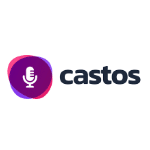
|
Unlimited bandwidth | Yes | $190/year-$990/year | |

|
20K-150K downloads per month | Yes | $15-$88 | |

|
Unlimited bandwidth | Yes | $7-$50 | |

|
Unlimited bandwidth | Yes | Free | |

|
10,000 downloads | Yes | $9.99-Quote-based | |

|
256kbps | Yes | $15/month | |
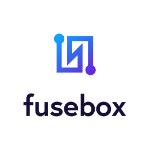
|
Unlimited bandwidth | Yes | $19/month |
1. Libsyn
Features
- Storage: From 162 MB monthly
- Bandwidth: Unlimited bandwidth
- Website Integration: Yes
- Analytics: Yes
- Content Repurposing: Yes
- Marketing and Monetization Support: Yes
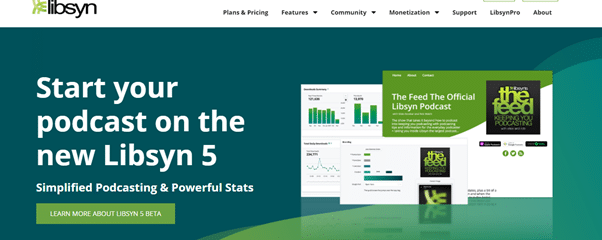
Libsyn takes our top spot for the best podcast hosting platform of 2024. The service has been around since 2004, having hosted thousands of shows, millions of podcast listeners, and billions of podcast downloads.
This is a robust podcast hosting solution, best known for its advanced analytics and distribution features.
Libsyn’s monetization features are its primary strength. The hosting platform allows you to easily connect with podcast sponsors and advertising partners without a hassle.
Podcasters can also access the platform’s advertising slots — that work like YouTube ads — to monetize their work. What’s more, you can also use Libsyn’s paywall feature to host premium podcasts for your subscribed listeners.
When you add additional features like unlimited bandwidth, customizable podcast sites, best-of-breed server uptime, and an easy-to-use interface, Libsyn becomes an attractive choice.
Pricing:
You can choose one out of three monthly pricing plans:
$5: 3-hour uploads & 162 MB storage.
$15: 6-hour uploads & 324 MB storage.
$20: 10-hour uploads & 540 MB storage.
You can get additional hours and storage added to your plan up to 55 hours and 3000 MB storage for only $150 per month.
Enterprise clients can request a custom quote.
- Updated user-friendly interface
- Unlimited bandwidth with all plans
- Preserves the original upload quality
- Advanced monetization abilities
- Seamless podcast scheduling
- Industry-leading customer service
- Custom ad-free podcast website
- Supports audio and video podcasts
- Easy to share and adjust podcast settings on different podcast directories
- There isn’t a free plan
- Libsyn does not offer a free trial
- You need a separate account to run multiple podcasts
2. Transistor
Features
- Storage: Unlimited, permanent storage on paid plans
- Bandwidth: 10,000 – 150,000 downloads/streams per month, depending on plan
- Website Integration: Yes
- Analytics: Yes
- Content Repurposing: No
- Marketing and Monetization Support: Yes
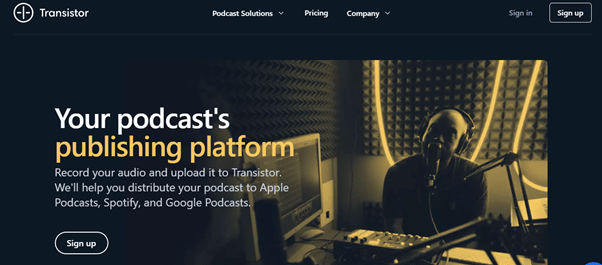
Transistor aims to do two things very well, above its competition — private podcasts, and superior analytics.
Private podcasts are suitable for those who want to have members-only listen to their content, or perhaps even charge per stream of each piece of content. Private podcasts are also widely used by companies who want to deliver secure content to their employees or shareholders.
Transistor’s analytics also excel, with a relatively detailed breakdown of listenership statistics, like average downloads per episode, total subscribers, and listener trends. All of those stats are aggregated from all of your platforms (e.g. Apple, Spotify, Overcast, etc.), which makes for quick top-down visualizations of your stats.
Those two areas of expertise might make one think it’s angled at professionals and large companies, but when you look at the pricing, it’s actually very accessible to beginner podcasters as well. The only tricky thing to consider is Transistor’s streams-per-month model — if you host multiple podcast episodes, your total streams per month will quickly shrink as your various shows eat into your stream count. To be fair though, if you are getting 10,000 streams a month on their basic plan, you’ll probably be more than happy to upgrade Transistor hosting.
To sum up, Transistor is ideal for enterprise and bigger brands, but the pricing is also accessible to beginners — although if you are in the amateur camp, you probably won’t be fully using all Transistor has to offer.
Pricing:
- Starter Plan: $15.83/month on annual contract – Upload unlimited new content per month. 10,000 podcast downloads/streams per month.
- Professional Plan: $40.83/month on annual contract – Upload unlimited new content per month. 50,000 podcast downloads/streams per month, with private podcasting.
- Professional Plan: $82.50/month on annual contract – Upload unlimited new content per month. 150,000 podcast downloads/streams per month, with enhanced private podcasting.
- Alternative pricing model where you get x amount of podcast downloads rather than bandwidth
- Focus on companies and professional podcasters
- Private podcasts for the secure enterprise, members-only, or pay-per-use
- Ability to host an unlimited number of shows
- Good analytics
- Podcast player can be embedded on any website
- Live chat support
- Allows teams to manage podcasts
- Once you have multiple shows, your allowed downloads will dwindle
- While priced well, beginners probably won’t be able to make the most of the features
- No free option is available
3. Buzzsprout
Features
- Storage: Unlimited, permanent storage on paid plans
- Bandwidth: 250GB per month
- Website Integration: Yes
- Analytics: Yes
- Content Repurposing: Yes, transcription services
- Marketing and Monetization Support: Yes
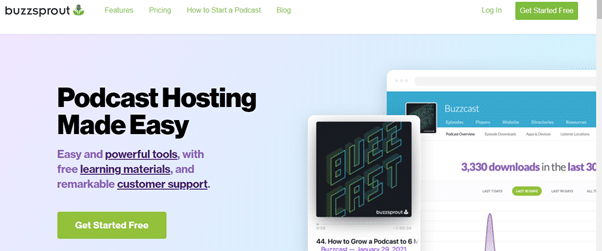
Buzzsprout has a focus on being quick and easy to use for both podcaster and listener, and that’s really apparent in its clean and straightforward interface. Everything is super simple, allowing you to upload and move audio very quickly.
That simplicity doesn’t mean minimal features though — not only can you add chapter markers, you can also create a unique video highlight reel to share on social media. Buzzsprout also offers Magic Mastering™ which will help your recording sound like it was engineered by the pros. You do have to pay for that, but it does make a difference to how professional you sound, especially if you are just starting out.
There are only a few things we’re not too fond of — if you pick their otherwise generous Standard Plan, they will downgrade your audio to 96kbps, which will sound pretty tiny and hollow. Also, if you want to upload a mountain of audio a month, Buzzsprout might not be your best option as you max out at 12 hours of new audio each month — after that, they charge per hour of uploaded content.
All in all though, if you are just starting in podcasting, we fully recommend Buzzsprout. The pricing is brilliant, it has more than enough features to help you grow, and if you have zero budget, they still have something to help you get started with their free plan.
If you decide to sign up from this link to Buzzsport, you’ll get a $20 Amazon gift card if you stay with them for at least 2 months.
Pricing:
- Free – Upload 2 hours of fresh content per month. 250GB bandwidth per month. Podcasts are deleted after 90 days.
- $12/month – Upload 3 hours of new content per month. 250GB bandwidth per month. Podcasts are never deleted as long as you’re on a paid plan.
- $18/month – Upload 6 hours of new content per month. 250GB bandwidth per month. Podcasts are never deleted as long as you’re on a paid plan.
- $24/month – Upload 12 hours of new content per month. 250GB bandwidth per month. Podcasts are never deleted as long as you’re on a paid plan.
- Extremely easy and clean interface
- Free plan available
- Offers multi-episode player
- Offer chapters within each episode
- Ability to create video snippet for social posts
- Lists content in all top podcast directories
- Magic Mastering™ to “sweeten” your audio files
- Offers audio transcriptions
- Affiliate marketing integration for monetization
- In-depth podcasting guides and tutorials
- Third-party integration with podcast tools
- The free plan deletes your audio after 90 days
- While Buzzsprout will automatically optimize your audio, they will reduce your quality to 96kps on the standard plan, unless you pay extra
4. Podbean
Features
- Storage: Unlimited, permanent storage on paid plans
- Bandwidth: 100GB per month on free plan, unmetered on paid plans
- Website Integration: Yes
- Analytics: Yes
- Content Repurposing: Yes, transcription services
- Marketing and Monetization Support: Yes
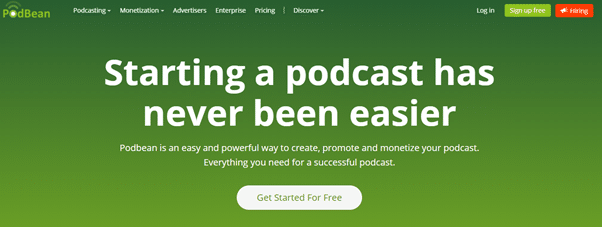
The first and last sentence to describe PodBean should be this: ‘Paid plans have unlimited uploads and bandwidth’. Considering their cheapest paid plan starts at just $9 a month, that’s a tremendous deal. Heck, even the free plan gives you 5 hours of content and 100GB of bandwidth a month — PodBean is definitely one of the most generous podcast hosters out there.
With PodBean you’ll get your website, and they’ll push your content out to all of the major providers while helping you with your social media marketing efforts. Their analytics are surprisingly excellent for the price, and they have built-in Patreon support for raising funds.
On the downside, some think the interface is a bit clumsy, but honestly, at these prices, we’re not bothered by it.
All of this stuff offered at such a low price really makes an excellent case for being the best podcast hosting platform on the market, especially if you’re on a budget.
All plans have a 1-month free trial, so go have a look at PodBean for yourself.
Pricing:
- Basic Plan: Free – Upload 5 hours of fresh content per month. 100GB bandwidth per month.
- Unlimited Audio Plan: $9/month on annual contract – Upload unlimited new content per month. Unmetered bandwidth.
- Unlimited Plus Plan: $29/month on annual contract – Upload unlimited new content per month. Unmetered bandwidth. Includes video podcasting and other features.
- Business Plan: $99/month on annual contract – Upload unlimited new content per month. Unmetered bandwidth. Includes video podcasting, multiple podcasts, and other features.
- In business for over 14 years, and over 7 billion downloads
- Friendly for beginners
- Lists content in all top podcast directories
- Can host video podcasts
- Free subdomain e.g. YouPodcast.podbean.com.
- Free plan available
- Design with customizable themes
- Dynamically add ad content for monetization
- Patreon support for monetization
- Repurpose content to Youtube
- Automatically post content to social media
- Mobile app
- Despite the offer of a subdomain, it probably won’t be enough for full web marketing/presence
5. Captivate
Features
- Storage: Unlimited, permanent storage on paid plans
- Bandwidth: 12,000 – 150,000 downloads/streams per month, depending on plan
- Website Integration: Yes
- Analytics: Yes
- Content Repurposing: No
- Marketing and Monetization Support: Yes
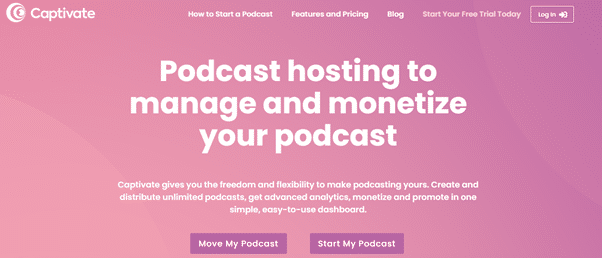
As you’ve probably figured out, most of the podcast hosting platforms listed here try to find a niche to stand out in. In the case of Captivate, that niche is definitely audience growth.
Upon investigation, it’s pretty clear Captivate has really taken some care into thinking about and implementing features that truly help podcasters increase their audience and profile, rather than just slapping on some shiny things to grab attention.
In terms of standout features to help podcasters grow their audiences, Captivate allows you to insert calls to action right in the podcast so you can do things like send people to your site, or be added to your email list.
Analytics are simple but robust, and that’s important when you need to figure out what is working and what isn’t working in terms of growing your audience. Captivate also works with the Interactive Advertising Bureau (IAB), which means all of their analytics are designed to be industry standard for podcasting — that means every stat is designed to be genuinely insightful.
Because growing a podcast often takes input from a lot of people, Captivate will also let you have unlimited team members on board — its little touches like that really help.
There isn’t too much on the bad side either, only that there is no free plan, and their streams per month model might not suit everyone.
If audience growth is your goal, definitely try Captivate’s free 7-day trial and see if their tools work for your audio ambitions.
Pricing:
- Podcaster: $19/month on annual contract – Upload unlimited new content per month. 12,000 podcast downloads/streams per month.
- Audio Influencer: $49/month on annual contract – Upload unlimited new content per month. 60,000 podcast downloads/streams per month, with private podcasting.
- Podcast Brand: $99/month on annual contract – Upload unlimited new content per month. 150,000 podcast downloads/streams per month, with enhanced private podcasting.
- Alternative pricing model where you get x amount of podcast downloads rather than bandwidth
- Focus on growing audience
- Intuitive interface
- Unlimited team members to share the workload
- Calls to action can be built into podcasts
- Ability to host an unlimited number of different podcasts
- Good analytics
- Automatic podcast website available
- The website has donation support
- Allows teams to manage podcasts
- Once you have multiple shows, your allowed downloads will dwindle
- No free option is available
Features
- Storage: 100MB to unlimited, permanent storage on paid plans
- Bandwidth: Unlimited bandwidth
- Website Integration: Yes
- Analytics: Yes
- Content Repurposing: No
- Marketing and Monetization Support: Yes
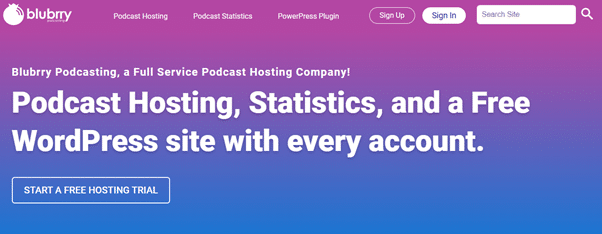
Blubrry makes it to our list of the best podcast hosting services for several reasons. The very first thing that strikes us about Blubrry is their unlimited bandwidth — not just on their higher-tier plans, but all plans. If you’re lucky enough to have a podcast or podcast with a lot of listenership, that unlimited bandwidth will certainly be a big selling point when you are looking for hosting platforms.
There is a price you pay for that unlimited bandwidth , however, and that is Blubrry’s rather paltry storage options. On their lowest plan, you’ll only get 100MB storage per month, which in most cases would equate to around just four hours of audio. There is a Professional plan with unlimited storage, but they don’t disclose the price for that (which is code for “expensive”).
The little storage they do offer however is not a strict limit though, as they will not charge you if you go up to 25% over your monthly storage limit.
If you are a WordPress user, you’ll enjoy the fact that Blubrry will give you a free WordPress website, and using their Powerpress plugin, you’ll be able to upload your podcasts directly from your website. This gives users one less interface to worry about, which is always a time saver.
Data-peepers will also be happy with Blubrry’s excellent IAB-certified analytics, however, a lot of the advanced analytics don’t come free with this podcast hosting service.
Ultimately, if you are a WordPress user who doesn’t want to worry about bandwidth, Blubrry is definitely worth a look. If you want to upload a lot of content every month, however, you might want to look elsewhere.
If you are curious, you can try out Blubrry’s one-month free trial.
Pricing:
- Small: $12/month – Upload 100MB new content per month. Unlimited bandwidth per month.
- Medium: $20/month – Upload 250MB new content per month. Unlimited bandwidth per month.
- Large: $40/month – Upload 500MB new content per month. Unlimited bandwidth per month.
- Extra Large: $80/month – Upload 1,000 MB new content per month. Unlimited bandwidth per month.
- Professional: $20/month – Upload unlimited new content per month. Unlimited bandwidth per month.
- Unlimited bandwidth on all plans
- No-fault for 25% overage on storage
- Good storage space
- Free WordPress website
- 24/7 email support, with scheduled phone and video conference support
- Powerpress WordPress plugin allows you to upload directly from your WordPress website
- IAB certified analytics
- Free media migration
- Options are pricey compared to the competition
- Extra analytics come with paid hosting plans
- No free option is available
7. Castos
Features
- Storage: Unlimited storage
- Bandwidth: Unlimited bandwidth
- Website Integration: Yes
- Analytics: Yes
- Content Repurposing: Yes
- Marketing and Monetization Support: Yes
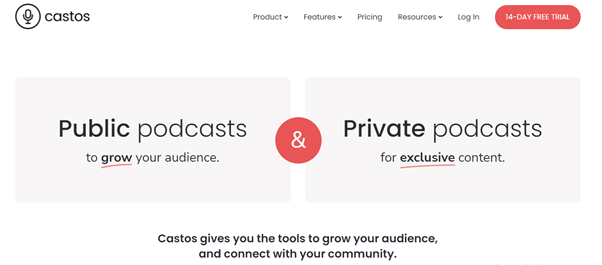
Castos Podcast Hosting platform is one of the most cherished platforms for podcasters in the industry. It offers a handful of widely cherished tools and integrations to take your shows to the next level.
With their Simple Podcasting WordPress plugin, you can work on your feeds and upload your episodes straight from WordPress.
Subscribing to their $19/month plan will also entitle you to unlimited uploads and bandwidth for each month. They are also offering a handy and customizable player that you can embed directly on your website. Here’s what else the podcasting solution is offering.
Pricing:
- Starter: $190/year-unlimited podcasts, upload and download limit; up to 100 private subscribers
- Growth: $490/year-Unlimited podcasts, upload and download limit; up to 250 private subscribers
- Pro: $990/year- Unlimited podcasts, upload and download limit; up to 500 private subscribers
- Optimized discreetly for your WordPress site
- Easy-to-use WordPress plugin
- Offers one of the most comprehensive suites in its basic plan
- The 14-day trial allows you to access everything Castos has to offer
- Automated transcriptions for all episodes uploaded
- Relatively pricier plans
- The $19 plan gives unlimited storage but limited space for experimentation
8. Simplecast
Features
- Storage: Unlimited storage
- Bandwidth: 20k-50k downloads/month
- Website Integration: Yes
- Analytics: Yes (basic)
- Content Repurposing: Yes
- Marketing and Monetization Support: Yes
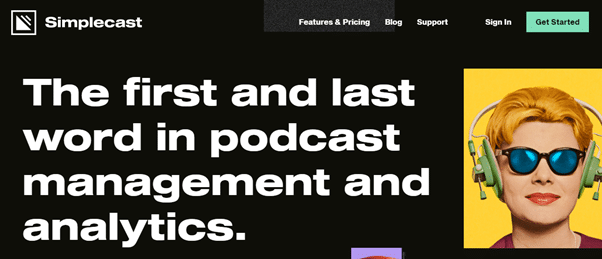
Simplecast recently underwent a massive website revamp to make itself more user-friendly. The podcast hosting solution caters excellently to both small and large businesses.
Starting in 2013, the podcast has grown to become one of the industry’s favorites. Its wide assortment of assistive tools consists of modern analytics and integrations.
Simplecast allows you to publish your audios with a single click on popular platforms such as Spotify, Apple Podcasts, and other platforms.
Here’s what you can look out for with Simplecast as your podcast hosting solution.
Pricing:
- Basic: $15-unlimited storage and uploads; 2 team member seats; distribution to most platforms visited by audiences.
- Essential: $35- unlimited storage and uploads; 4 team member seats; distribution to most platforms visited by audiences.
- Growth:$85- unlimited storage and uploads; 9 team member seats; distribution to most platforms visited by the audience; metric comparison across five episodes.
- User-efficiency
- Affordable packages
- Excellent customer support Insert pros here
- Podcasters can publish content across various audio-uploading channels with a single click
- Offers custom web-domain
- Comes with a “managing team” feature great for multi-member podcasting teams
- Has a below-average rating for its “uptime feature
- RSS feed also struggles with a rating of 53%
9. Spreaker
Features
- Storage: 100 hours of audio storage
- Bandwidth: Unlimited bandwidth
- Website Integration: Yes (with Pro Plan)
- Analytics: Yes
- Content Repurposing: Yes (basic)
- Marketing and Monetization Support: Yes
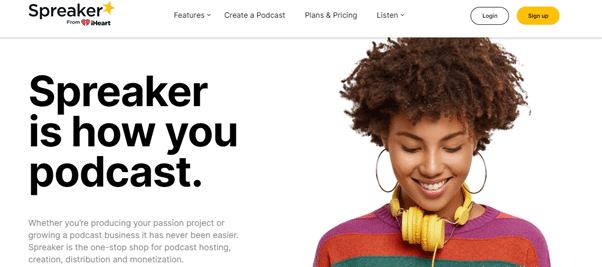
Starting in 2012, Spreaker has emerged as a competitive podcast hosting platform. Among other things, Speaker offers users a simple way to create and distribute podcasts, modern analytics around monetization, and listener statistics.
Spreaker is also known for its sleek and easy-to-navigate user interface. Managing your audio storage is a breeze with Spreaker. It has also become more inclusive ever since it released its mobile application for iOS and Android users.
By uploading your episodes on Spreaker, you are sending them directly to a listening platform. Similar to SoundCloud, audiences can use the Spreaker platform to listen to their favorite podcast and share these across their most cherished platforms.
Pricing:
- Free Speech: Free sign-up-multiple podcasting hosting; you can upload episodes to iHeartRadio, Spotify, Apple Podcasts
- On-Air Talent: $7/month- multiple podcasting hosting; you can upload episodes to iHeartRadio, Spotify, Apple Podcasts; programmatic monetization and customizable RSS Feeds and
- Broadcaster: $20/month- everything included in the On-Air Plan; paid subscriptions; advanced settings
- Anchorman: $50/month- everything included in the On-Air Plan; paid subscriptions; advanced settings; customizable player colors
- Sleek and intuitive interface
- Improves visibility with its one-click distribution and listening platform
- You can record and upload new episodes and initiate live streams
- Allows users to create transferable podcasts
- Free lifetime version
- Issues reported around refund upon subscription cancellation
- Customer service can improve
10. Anchor
Features
- Storage: Unlimited Storage
- Bandwidth: Unlimited Bandwidth
- Website Integration: Yes (WordPress)
- Analytics: Yes
- Content Repurposing: Yes
- Marketing and Monetization Support: Yes
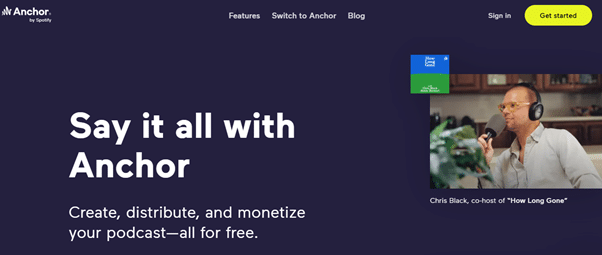
When it comes to creating podcasts with a loyal following, Anchor is the go-to hosting solution for many.
Anchor offers one of the industry’s best podcasting applications for mobile users. Creators can now run their podcasts exclusively from their phones. Its additional features include a simple interface, easy music import, etc.
Yes, as mind-blowing as it sounds, the hosting solution is free to use. But the greatest thing about Anchor is that it comes with no subscription cost! So, what else can you get along with massive cost-convenience? Here’s a quick look.
Pricing:
- Anchor is free to use.
- Creative hosting platform without time or money constraints
- Additional tools and features making it a diverse solution
- You can create and edit your episodes on the go
- Musical interludes; background effects; sound effects, etc. make your episodes more creative
- Audience engagement features; such as voice record for audiences
- Content rights are reserved by Anchor
- Limited control over the final product
- Running the podcast from the phone can be cumbersome
11. Audioboom
Features
- Storage: File size limited to 500 MB and 300 minutes per episode
- Bandwidth: 10,000 downloads
- Website Integration: Yes
- Analytics: Yes
- Content Repurposing: Yes
- Marketing and Monetization Support: Yes
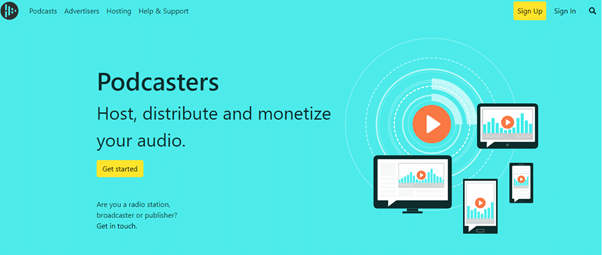
Audioboom is another industry favorite that prides itself on helping podcasters create and manage engaging podcasts worth listening to.
Its unique features make hosting, distributing, and monetizing your account a breeze. With its intuitive set of tools and integrations, Audioboom can be the one-stop management hub for up-and-coming podcasters.
Audioboom has your typical suite of hosting features but it also goes above and beyond a generic hosting platform by allowing management of multiple podcasts from a single place.
For these reasons, Audioboom is a favorite with radio groups, podcasting networks, etc. Here are all the other ways, the podcasting solution can help you be more creative with your shows.
Pricing:
- Podcaster: $9.99/month- unlimited uploads per month, 10,000 plays per month, distribution across Apple, Spotify, iHeartRadio, Google Podcasts, and Stichter.
- Podcast Pros (Accessible for podcasters over 10,000 plays): quote-based; unlimited episodes, unlimited plays per month, distribution across Apple, Spotify, iHeartRadio, Google Podcasts, and Stitcher.
- Strong distribution partners; integrates with Spotify, Apple, and Stitcher
- Can compile analytics from each of its partners/integrations
- Embeddable players to integrate your podcast into different social media, websites, or blogs
- Trackable promo code to help you with promo and land better sponsorship chances
- Offers users dynamic advertisements to target audiences in real-time and increases engagement with local and national ads, video spots, etc
- Can manage multiple podcast channels from the same platform
- Midroll ad-insertion to optimize revenue
- There’s no mobile app
- To hit the Podcast pro Plan you must hit a relatively higher threshold
12. SoundCloud

Features
- Storage: Free Plan gives 3 hours of audio storage, Unlimited Plan gives unlimited storage
- Bandwidth: 256kbps
- Website Integration: Yes (WordPress)
- Analytics: Yes
- Content Repurposing: Yes
- Marketing and Monetization Support: Yes

Let’s face it, SoundCloud is possibly one of the first names that come to your mind when you think of podcast hosting platforms. Originally designed to host podcasts, the platform quickly became the go-to site for artists and creatives to share their passion for music.
At the same time, podcasters continue to rate SoundCloud as one of the most effective distribution platforms.
One of the greatest features of SoundCloud is that it is designed primarily for audience engagement. Your listeners can easily download, like, and share your podcasts on their favorite platforms.
With SoundCloud’s premium plan, there are a handful of operations you can perform. These include scheduling your episodes, receiving unlimited hosting time, engaging your fans with direct messages, and interacting with fans in the comments section.
Pricing:
- Basic: free-up to 2 hours of upload time; real-time statistics; lossless HD storage; embedded player
- Pro: $7.50/month- up to 2 hours of upload time; real-time statistics; lossless HD storage; scheduling available; embedded player
- Great audience engagement features
- Easy distribution across your favorite social media channels
- Listeners can easily download your podcasts from the company’s designated app
- You can upload your music and podcasts for free as well as share content without getting charged
- Offers access to a much wider being one of the most familiar platforms; around 175 million unique listeners are tuning in each month
- The free plan comes with a limited upload tome of 2 hours
- Cannot bulk upload audios from your existing RSS feed
Honorable Mention: Fusebox

Features
- Storage: Free Plan gives up to 10K monthly views and 3 shows; Pro Plan gives up to 100K monthly views and more than 3 shows
- Bandwidth: Unlimited Bandwidth
- Website Integration: Yes
- Analytics: No
- Marketing and Monetization Support: Yes
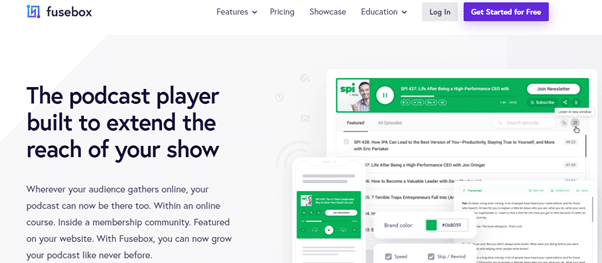
plugin that allows you to share your podcasts on your websites and blogs.
Fusebox does not serve as an independent podcast hosting platform but you can use the WordPress player to transform your websites into a podcasting PowerStation. It can help you upload the podcasts to your websites and can encourage binge-listening, audience retention, and conversion.
It is a fully customizable tool that users can work with in various modes: Full Player, Sticky Player, Smart Track Player. Here’s what more Fusebox can do for your podcasts.
Pricing:
- Free: eliminates most of the features; sticky player; transcripts
- Pro: $8/month: three different play modes, customizable front end; transcripts
- Comes with an inbuilt email capture tool
- Listeners can easily download the episodes; share and subscribe
- Customizable front-end; you can experiment with images, colors, etc
- Comes with listener-friendly features such as forward and rewind buttons and speed controls
- Simplistic and Easy-to use
- The different modes of display help you highlight the episode while matching it with the website’s interface
- Sound customer support
- Mobile responsive
- Restricted to WordPress websites and blogs
- Does not offer chat support or ticketing system
FAQ About The Best Podcast Hosting Platforms
Looking for some quick fixes? Below, we have answered some of the most common queries amongst aspiring podcasters.
What is the best hosting platform for podcasts?
The best hosting platforms for podcasters will be the ones that offer a wide availability of features such as storage, compatibility, multimedia capabilities, ease-of-use , etc. Some of the best podcast hosting sites are Buzzsprout, Transistor, Podbean, Captivate , and Blubrry.
Where can I host my podcast in 2024?
You can host your podcasts on a podcast hosting platform. Just like how you can store visual and text-based content on a website, you can both host as well as store your media files on these hosting solutions for download and distribution.
Which is better, Podbean or Buzzsprout?
The choice between Podbean or Buzzsprout will boil down to your podcasting goals and business aims. Buzzsprout offers wider functionality for repurposed and affiliate marketing but is restrictive with basic plans. Podbean comes with great functionality but offers a more limited list of marketing tools.
Which podcast hosting platform is the most popular?
Some of the most popular podcast hosting platforms are Buzzsprout, Podbean, Blubrry, Libsyn, Castos, Simplecast.
Is Buzzsprout better than Podbean?
This really comes down to what you are looking for. However, if you plan for your podcasts to serve the dual function of being a passion outlet as well as a business marketing tool, then Buzzsprout should be a preferred choice.
What is the best free podcast hosting platform?
Due to the ease of functionality, a wide suite of podcasting assistive functions, storage, multimedia capabilities, and most importantly, the lifetime free plans, Podbean and Buzzsprout are some of the best free podcast hosting platforms.
Conclusion
There are plenty of podcast hosting solutions out there, but we’ve done our best to distill them into the top six — that should be enough to suit most needs, without overwhelming you with choice.
The best bit is that every single one of the podcast hosting providers in this list has a free trial, and some even have completely free permanent options. So really, nothing is holding you back from giving podcasting a go. Remember, even the podcasting greats took time to break the top ten, so set your goals and work with your podcasting host services to analyze your data to work towards those goals.
If you think we’ve missed anything in our reviews, please let us know in the comments, help the community with your knowledge!
Photo Credit: Unsplash

